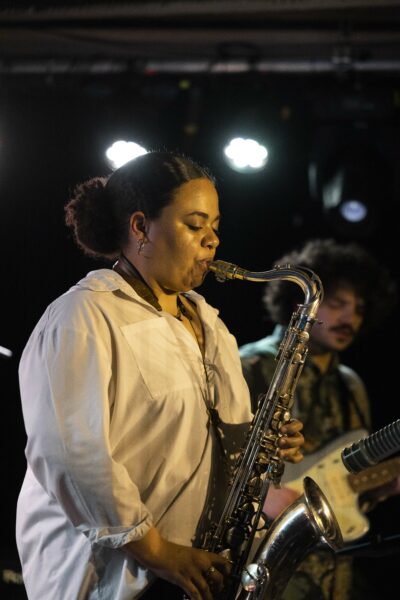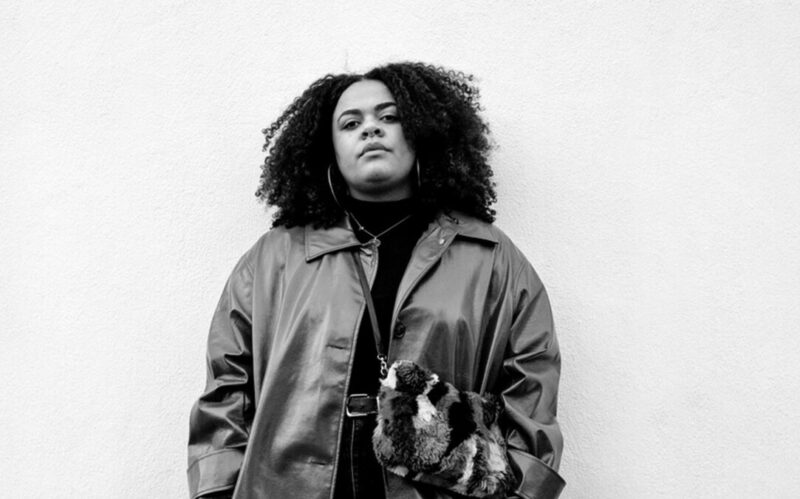As I await jazz saxophonist and composer Chelsea Carmichael in front of the Michelberger Hotel on this mild Saturday night, I am still buzzing from the show she and her bandmates have just delivered in the packed downstairs cellar in the Fluxbau, just some hundred metres away from where we meet. Right next to the Spree river, the quartet was closing off a day full of vibrant shows down at the XJAZZ! Festival with the tight rhythmic heat and blazing guitar arrangements, all of which framed the undeniable warmth and melodic power of an impassioned sax performance.
“What I really like about the XJAZZ! festival is not knowing a lot of the acts that are on the line-up. It’s great to check out stuff that I’ve never heard of or don’t know. Some festival line-ups can become quite predictable now, depending on who is currently doing really well. The line-ups can look the same, but this festival has always got some interesting things happening.”
Her debut The River Doesn’t Like Strangers released in 2021, Chelsea Carmichael draws on the lineage of Black music making and the Caribbean diasporas that has a substantial effect on how she plays music, she assures me, as we touch the context of her Jamaican background towards the end of our talk in the noisy backyard of the hotel. Building on smooth roots, with her saxophone being the prime blast pushing forward the melodic thrill, her sound unfurls a diverse and progressive vortex that channels the sweet touch of euphoria, as the electric guitar, spring bass and the drums take turns in leading that mission along with their hypnotic lead.
Not Just London
Hailed as one of London’s new figureheads in the contemporary jazz scene, it is not without some unease that Chelsea talks about the issues of the British capital and its standalone entitlement. However, she claims that “it is a really great place to be, despite my feelings around London as a place, which is increasingly becoming a playground of the rich, the cost of living there is insane. The current government is crap as well.” Yet, “the music there is great, the people are great as well”, she affirms. “So many great nights to go to, places like Church of Sound and Jazz Refreshed”. Also, she has come to value the accessibility of London gigs: “They really try to put price points at a place in which anyone can come through. You have really diverse audiences, which is what’s important as well. It’s not just about diverse lineups, but also diverse audiences. It’s great for that.”
“There are unbelievable things happening up in Glasgow, Leeds, Manchester, and Brighton as well. Sometimes the London jazz thing can lead to people not discovering things outside of London. It takes up a little bit too much space. I think we should be talking about the British jazz scene and not the London jazz scene.”

Chelsea Carmichael on stage (photo by Eike Walkenhorst, courtesy of XJAZZ!)
That, for many, London is the navel of contemporary jazz progress and scene happenings is a problem in itself, as it “doesn’t give the right credit to people that aren’t based in London, who are making incredible music too”, Chelsea Carmichael argues. “It is great to be part of the London jazz scene, but whenever I get asked about it, I’m always like, it’s not just London, check out other things as well”, she adds and it is a refreshing view of things for someone who is located at what is supposed to be the heart of the scene and profiting from the benefits of that. The heart of jazz music may beat loudest in the capital, but that does not mean it is the only one keeping the music alive in the UK.
Black US-American Music
“Jazz to me is Black American music”, Chelsea Carmichael ponders as we dive further into her own sound. “It is Black classical music if you like”, she adds. “That’s where it comes from and that always has to be acknowledged”. As that, her own approach to music-making is one that is marked by an inherent reflection of the politics and identity of the origins of jazz. “I like to refer to it more as Black improvised music”, she says. “If you delve into the history of the word jazz, it was actually a derogatory term, it was not favoured by jazz musicians. And yeah, there’s a heavy political side to it, for sure.”
“Jazz music was about struggle, about politics, about social issues.”
As we further reflect on the power of representation that Black musicians like her hold for the heritage, it is important for Chelsea to emphasise that “anyone of any race, gender, age can play jazz. It is not about gatekeeping it and saying only Black people can play jazz”. Yet, she makes a strong point for the historical implications and confrontation with the roots of the music, which is often missed:
“It is about is acknowledging the roots of [jazz music] and where it came from. Sometimes a lot of that can be missed. In jazz education, sometimes we don’t put enough emphasis and respect on it.”
While music schools teach extensively about the background and theory behind, for instance, European classical music, Chelsea leads on, the same does not ring true for jazz. “I think that’s where with jazz sometimes we choose to ignore the true origins of it”.
Inner Voices
As for her own musical endeavours, Chelsea Carmichael not only puts the historical discourse about jazz in the centre of her creative power but channels her Jamaican roots as part of her own artistic identity, as she opens about it towards the end of our talk: “I kind of started to delve into some more traditional Jamaican folk songs and stuff like that. I think having a lot of that music in my upbringing and also in my DNA really definitely informs the way that I play, for sure.”
The River Doesn’t Like Strangers in the end is a vital documentation of this dispute and speaks volumes of the internal struggle, which the artist has managed to turn into a resounding work of art. It does not come as a surprise however that the title piece of the album, mounting up to almost eleven minutes duration, draws back to a teenage experience she had when visiting her father’s country for the first time, that neatly wraps up notions of identity, belonging and origin.
“The first time that I went to Jamaica with [my father], I think I was probably about 16… there’s a river that runs through the village that he grew up in. He’s not a particularly religious person or superstitious, really, at all. But he was kind of watching me quite eagerly as I was swimming in this river. And basically he explained that a lot of people had had accidents in the river or drowned, that sort of thing. The people who had those accidents or drowned were not from the area.”
The River Doesn’t Like Strangers is available everywhere via Native Rebel Recordings. Get your copy over at Bandcamp.



